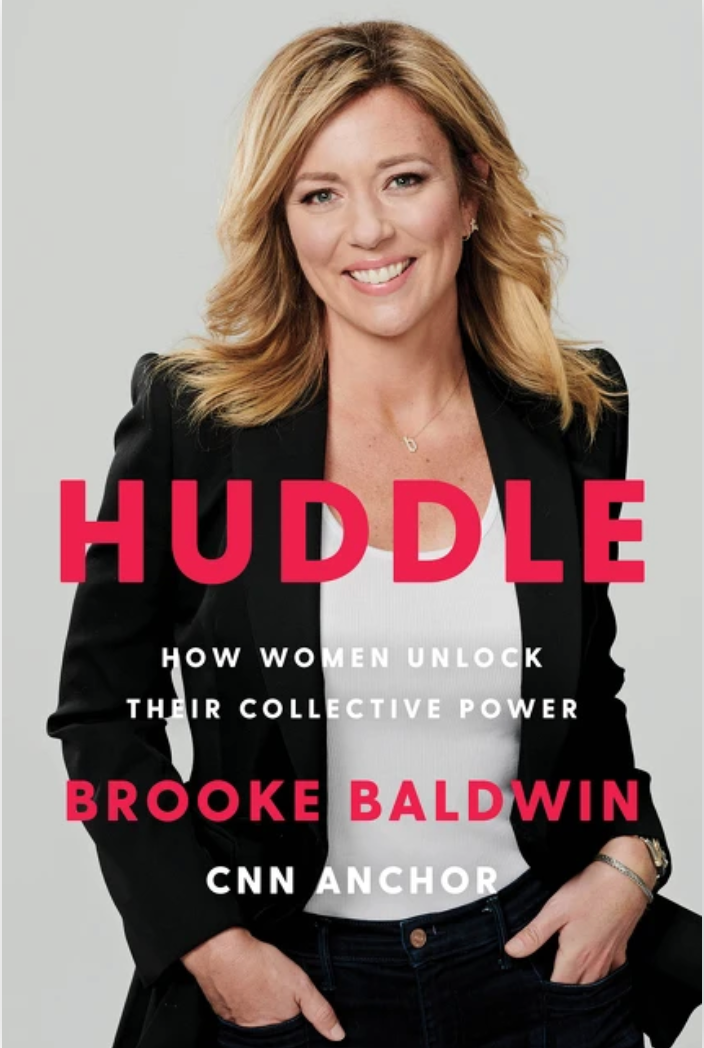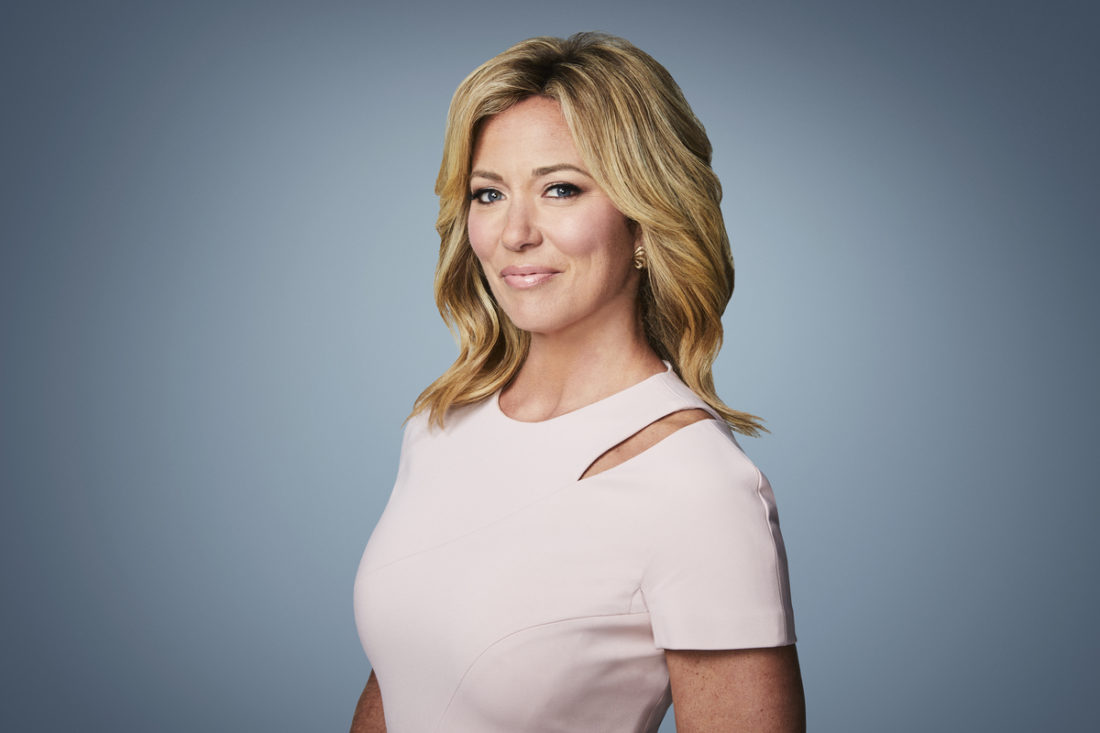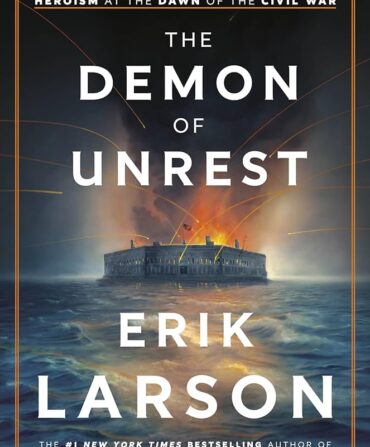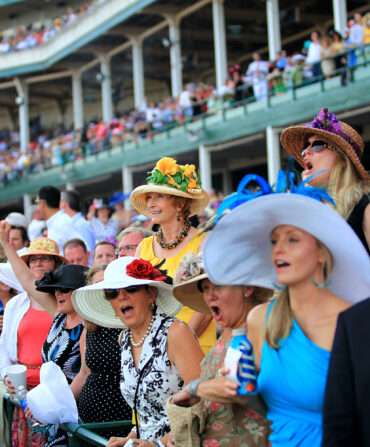“The journey that was this book changed my life, and if I can just sprinkle a little fairy dust for women around America, to have a little bit of what I’ve had, then I’m a happy camper.” Brooke Baldwin tells me this at the beginning of our conversation, before I’ve even asked her a question. But the Atlanta native isn’t one to wait around for her chance. For the last decade, she’s been behind the afternoon news desk and in the field for CNN, a gig she landed after moving back in with her parents so she could start freelancing in 2008 for her hometown news network, following local-news stints in Virginia, West Virginia, and Washington, D.C. She quickly proved her worth, becoming one of the youngest people to anchor a show on CNN, a move that led her to New York City.

In February, Baldwin announced she was leaving CNN to strike out on her own, a departure that coincides with the debut of her first book, Huddle: How Women Unlock Their Collective Power. She views a “huddle,” she writes, as “a moment that brings women together in any time or place—whether on the front lines of a public protest or in a quiet church basement—to provide each other with support, empowerment, inspiration, and the strength to solve problems or enact meaningful change.” In the book, Baldwin travels across the country meeting just such huddles, from some of the seventeen Black women who won judgeships in Texas in 2018 by campaigning together, to the Filmmaker Lab for Girls put on by Reese Witherspoon and her Hello Sunshine media company to empower the next generation.
The experience proved transformative for Baldwin, a process she shares with us here. And as for her next steps? Well, she has a few ideas.
In the book, you call your mother “my original huddle.” And you wrote about her, too, in your essay about growing up in the South for Garden & Gun’s Southern Women book. How did she influence you?
There is no greater bond than mother and child, and in our case, mother and daughter. As a little girl when I was doing backflips off the neighborhood pool in Atlanta at age four, I’m sure other moms were like, Who is this kid on the diving board? But my mom, she instilled in me that kind of quiet confidence early on. When I was a little girl, I’d crawl into bed with her at night, or she’d tickle my back and tell me a story, and the story was always was about me, either doing something great or being brave. And that mattered when I was itty-bitty. So as I have grown and really lived some of my dreams, she has been my biggest cheerleader. Sometimes she’ll joke on the phone, “I can’t believe I know you!” And I’m like, “Mom, you birthed me, you created me, I am yours, this is thanks to you!”
The line in the [book’s] dedication, about “How do you hold a moonbeam in your hand,” that’s a line my mom gave at my wedding. You know, my mom, Southern woman, I don’t know how old she was, like seventy, had never been handed a microphone in her life. Had never been encouraged to speak up. One of five girls growing up in the South, father was a Presbyterian minister, it was like, fall in line, do as you’re told, and don’t make a fuss. So when I handed my mom this microphone, she ran with it, and gave the most beautiful speech. But I remember that moment, when she was quoting that Sound of Music lyric, it just touched my heart, and I wanted to include that. She has no idea that I’m dedicating the book to her, and I can’t wait for my moment when I share that with her and share some tears.
This book mixes memoir; history, as you’re reporting on these huddles across the country and the world; and then almost self-help, in a way, in that there are these moments of recognition when I thought, Oh yeah, I should be doing that! How did you decide on that approach?
I’ve been a journalist for twenty-one years, so my natural inclination is to make the story about someone else. That’s where I’m most comfortable. So I could have done the whole book just about these various huddles of women. But I realized that in order for me to tell these stories, I needed to be real with the reader early on and explain: Why am I the person who should have the microphone, who should be the person sharing these stories? Why do I have this authority, other than being a journalist for two decades?
I wanted to do something that I really don’t do in my day job, which is to lift the curtain a little bit on me and my personal life, my own history of girlhood, and my getting older and climbing the ladder within this male-dominated profession of TV news, and to come clean with how I really haven’t had a huddle in my older years, as I was clawing toward success. And how this experience, and being like a sponge with all these trailblazing women, has ignited this magic in me to activate my own huddle, and that’s exactly what I’ve done. With the self-help part, I didn’t even think of that—maybe it’s a little of my own woo-woo coming through in the book, and maybe my adoration of the Brené Browns of the world, and just wanting to share that realness of myself with the reader.
The book follows you as you interview a diverse set of women who are creating their own powerful huddles. How did you decide on who to include?
In the back of my head, I’ve had a wish list of women I’ve wanted to interview but just haven’t been able to on my own show. I wrote this book when the news cycle was at a fever pitch in the Donald Trump presidency. And even though I had two hours to fill, it was my own show, a lot of the news of the day—the tweets, the trials, the investigations—it was what I needed to cover as a journalist day-to-day. So I had to put my own passion for women on the backburner. And boy oh boy, did I have a mighty tall list when it came time to finally be able to live out these interviews.
So I knew I had wanted to interview those Houston judges, and I was very conscious of starting the book, my Huddle journey with them. Because meeting them was like meeting rock stars, number one. And number two, I know, as a privileged white woman growing up in the South, my experience was obviously much different from theirs, growing up in the South as well, in Texas. And I wanted to make sure I was honoring that rich history of huddling among Black women, and really setting that tone in my book, and essentially going to church with them over shrimp and grits at this crowded table in Houston, and having them explain to me how they campaigned as a huddle, and still huddle together on the bench.
Of course, I had a relationship with Stacey Abrams from when she was running for governor. I had interviewed Ava DuVernay for my American Woman series. I had been in that anchor chair so many times during tragedies and mass shootings, and so I really wanted to honor Moms Demand Action and Shannon Watts, and Congresswoman Lucy McBath—I had interviewed her multiple times for my day job. This was the perfect excuse to live my dream, and interview WNBA players, and U.S. Women’s National Team players, and hockey players. I just was like, Hey Megan Rapinoe, I’m writing a book and I really need to interview you. And I am dying inside, because she’s such an icon, and so is her partner, Sue Bird. Or Paulette Jordan, talking about wanting to give nature a voice in the climate movement. I’d wanted to have an indigenous voice in the book, that really mattered to me, and I’d met her on her family’s reservation, on her family’s land, for a previous story at CNN.
And then of course my own girls, my own huddle, all of whom I know from Atlanta and are now scattered around the country. But they’re my huddle that I activated in the process of writing this book. So to interview my bestest friend, Aki, was totally self-serving, and so fun, to turn the tables on her and to include her and our precious relationship, and also her daughter. And that’s how I end the whole book, with the next generation of huddlers.
How do you maintain your huddles now?
Two things. One, I approach these friendships like it’s my job. These women in my life are not people who just appear and I periodically text. We’re all on this group text chain. If a day goes by and I don’t hear from one of them, I’m like, Ladies, what’s up, what’s going on, how’s X, Y, and Z? Number two, it’s about showing up vulnerably. Whether it’s shining a light on a tough moment in my marriage, or someone else’s marriage; or one of the other ladies has been honest about mental health struggles, and depression, which has only been exacerbated during the pandemic. And certainly during the racial reckoning that is happening in America, we’ve been having bigger conversations around that.
You mentioned you met the women in your huddle in Atlanta. What do you miss about living in the South?
Of course, my mom. It’s everything from squeezing my nephews, my brother, my sister-in-law, they’re all down there; to walking the Beltline; to going to Piedmont Park and hanging out around Midtown and Virginia-Highland—I have so many of my nearest dearest friends and family there, it really is home. Just sitting on a back porch with a glass of champagne with a group of girlfriends and connecting, having long talks, I miss that.
Your husband, the producer James Fletcher, is British. What does he think when goes back home with you?
He is from Northern England, which is rural and green. He grew up, not with dogs, but with goats and cows, on pastures. Even though it’s the northern part of England, it’s almost like it’s the South. He loves it. He’s almost awakened me to it more. There’s no other airport I know of in the country where they literally will welcome you. There are welcomers [at Hartsfield-Jackson] who are like, “Welcome to Atlanta!” And he’s like, “Where are they going to be?” He gets so excited, like, “When am I going to get welcomed?” He also gets so tickled when we’re in an Uber and the driver just wants to chat the whole time. In New York, you get in, and it’s like, “Are you Brooke? Okay.” And you don’t talk till you’re at the place. But back down South, everyone is talkative, and open, and kind, in a way that he’s tickled by.
After you announced you’re leaving CNN in April, you guest-hosted Ellen. I know your future plans are still in progress, but what else would you like to see for yourself going forward?
The Ellen thing was a total pinch-me experience. I’d love to be able to go and guest-host it again. But I’m so moved by my book, and a huge reason why I’m moving on to another chapter is because of my book. After two years of going in so deep, and interviewing these trailblazing women, and then the interview would end, I’d turn off the tape recorder, and they’d turn the tables on me in a way that never happens in my day job: They’re asking me, All right, Brooke, tell us your story. And why are you writing this book? And do you have a huddle? Tell us about your voice, and what you want to do. One after the other after the other. How could I not have a come-to-Jesus with myself? And in that come-to-Jesus was, How can I stand in the space of these women and not be the bravest I possibly can? And that involves moving on. And it was a painful, hard place to be, because CNN has been my family and my home for half of my career, over a decade.
I do not know what I’m doing next. But I do know if I could wiggle my nose, it would be taking this concept of Huddle … I’m a TV person, right? So it kills me I didn’t have TV cameras at all of these interviews. I would love to create some sort of unscripted docuseries where I take viewers on a journey through various huddles around the country, within a visual medium, and have it be bought by Netflix, or Apple, or something like that. I’m just putting the dream out there! That’s something I’m working on. Beyond that, I would love to go and fill back in for Ellen, and who knows, the talk show host thing? That would be kind of cool. But I have nothing solid. I’m just doing a backflip off the high dive and seeing where I land.








